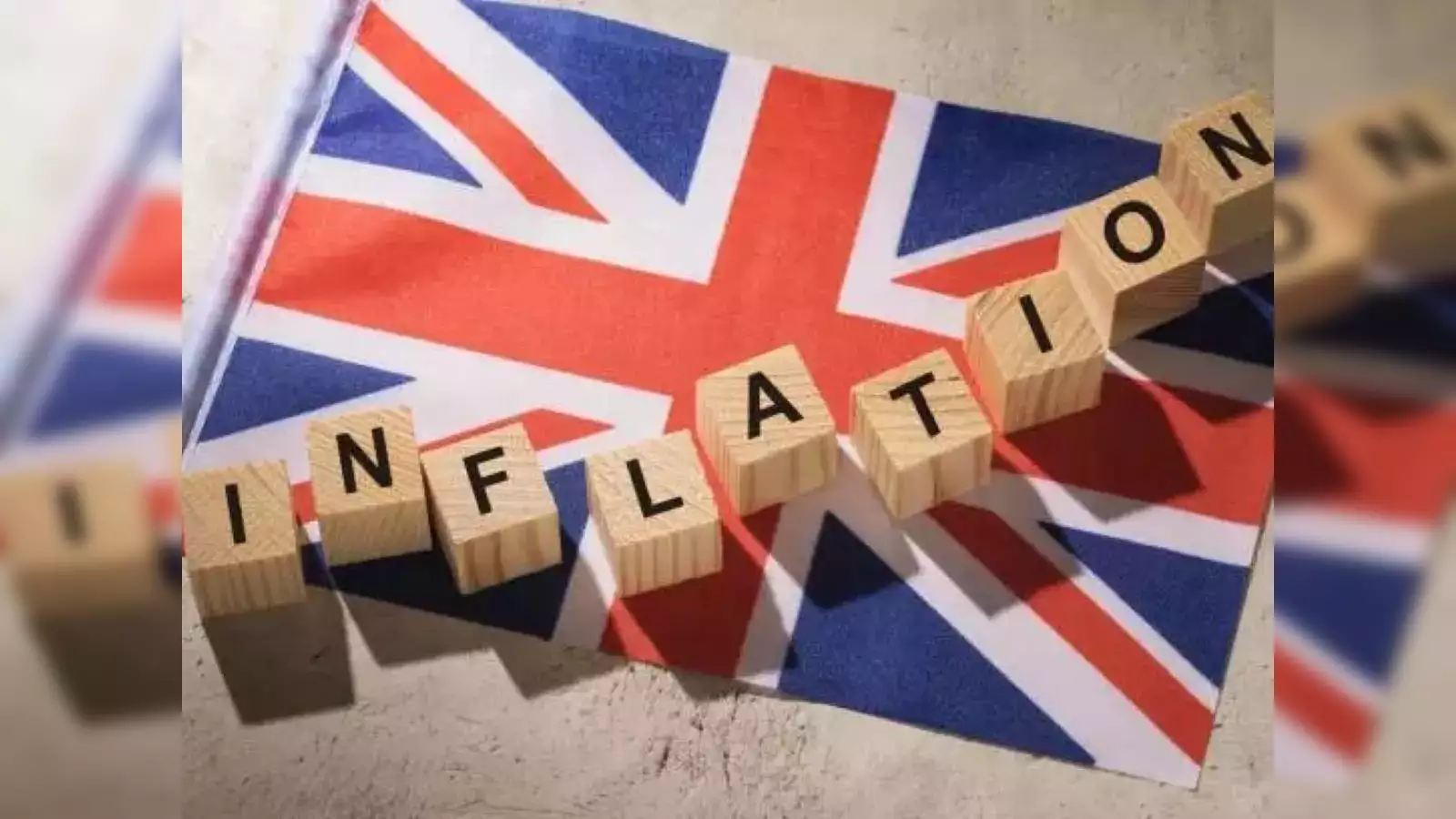Inflation in the United Kingdom surged to a six-month high in October, climbing to 2.3%, up from 1.7% in September, driven largely by increased domestic energy bills and persistent inflation in the services sector. The rise pushes inflation back above the Bank of England’s target rate of 2%, complicating efforts to ease borrowing costs amid uncertain economic conditions.
Energy Prices Lead the Inflation Spike
The Office for National Statistics (ONS) attributed the spike primarily to rising energy costs, which have strained household budgets despite government measures to cushion energy price volatility. The return of higher energy prices is partly due to global supply constraints, compounded by geopolitical factors, including disruptions linked to the ongoing Russia-Ukraine conflict.
The Energy Price Guarantee, implemented to cap household energy bills, expired earlier in the year, exposing households to market-driven prices. As a result, many households have seen energy costs climb by 15-20% compared to the summer months.
Additionally, the seasonal increase in demand for heating during autumn has exacerbated the burden, particularly for low-income households.
Persistent Inflation in the Services Sector
Inflation in the services sector, which constitutes nearly 80% of the UK economy, remains a significant contributor to the elevated inflation rate. Key drivers include wage growth pressures in industries like hospitality, transport, and healthcare. With wages growing at an annualized rate of 7.5%, employers have passed on increased labor costs to consumers, further fueling inflation.
Impact on Interest Rate Policy
The inflation uptick complicates the Bank of England’s (BoE) monetary policy stance. Earlier this month, the BoE cut its benchmark interest rate by 0.25 percentage points to 4.75%, marking the second reduction in three months, as inflation appeared to be under control.
However, Andrew Bailey, Governor of the BoE, has signaled caution against swift rate cuts, citing concerns over budgetary measures introduced by the new Labour government. Bailey emphasized that fiscal policies, such as increased spending, could amplify inflationary pressures, limiting the scope for further monetary easing.
The BoE’s Monetary Policy Committee (MPC) is set to meet on December 19, by which time it will have more data to assess inflationary trends. Market analysts predict that the central bank may maintain its current rate or opt for a modest cut to avoid derailing efforts to achieve sustainable price stability.
Labour Government’s Budget: A Double-Edged Sword
The budget unveiled by Chancellor Rachel Reeves in October announced an additional £70 billion in spending, funded through higher business taxes and borrowing. The government aims to stimulate economic growth and address key social challenges, such as housing shortages and strained public services.
While the spending package is expected to provide short-term economic relief, economists warn that it could exert upward pressure on inflation. Businesses facing higher taxes are likely to pass on the costs to consumers, leading to higher prices for goods and services.
“The combination of increased government spending and tax-driven price adjustments may keep inflation above the Bank of England’s target in the coming quarters,” said Monica George Michail, an economist at the National Institute for Economic and Social Research (NIESR).
Global Inflationary Pressures
The global inflation outlook has also grown more uncertain following the reelection of Donald Trump as U.S. President. Trump has pledged to cut taxes and impose tariffs on certain imported goods, policies that could spark inflation in the United States and ripple through global markets.
With the U.S. as a significant trading partner, the UK could face indirect effects, such as higher costs for imported goods and increased pressure on export-dependent industries. Economists anticipate that these factors could prolong the period of elevated interest rates globally, including in the UK.
Consumer Impact and Cost of Living
The inflation surge directly impacts British households, particularly as food and housing costs remain stubbornly high. Recent data indicate that:
- Food prices have increased by 6.4% year-on-year, driven by higher costs for staples like bread, dairy, and vegetables.
- Rents have risen by 5.3% over the past 12 months, reflecting strong demand and limited supply in the housing market.
Consumer confidence has dipped, with many households cutting back on discretionary spending to cope with rising costs. According to a survey by YouGov, 62% of respondents reported difficulty in affording energy bills, up from 48% in September.
Challenges for 2025 and Beyond
Looking ahead, economists predict that inflation could exceed 3% by early 2025, delaying the pace of interest rate cuts. NIESR projects that rates may remain elevated through 2025 as the BoE prioritizes price stability over economic stimulus.
Key factors influencing the inflation trajectory include:
- Global energy prices, which remain volatile due to geopolitical tensions.
- Wage growth, as labor markets continue to grapple with skill shortages.
- Fiscal policies, particularly the implementation of the Labour government’s ambitious spending plans.
Government and BoE Response
The government has pledged to monitor inflation closely and adjust policies to shield vulnerable groups from the worst effects of rising prices. Measures under consideration include:
- Reintroducing targeted energy subsidies for low-income households.
- Expanding food assistance programs to combat rising grocery costs.
- Partnering with private sector players to address supply chain inefficiencies.
The BoE, meanwhile, is expected to adopt a cautious approach, balancing the need to support economic growth with its mandate to maintain inflation at 2%.
Conclusion
The resurgence of inflation to a six-month high in October underscores the complex interplay of domestic and global factors shaping the UK’s economic landscape. Rising energy prices, persistent wage pressures, and fiscal policies are testing the limits of monetary and fiscal tools, leaving policymakers with difficult decisions ahead.
While the Bank of England is likely to remain cautious in cutting interest rates, sustained efforts from both the government and central bank will be essential to navigate the inflationary challenges and ensure economic stability. For households and businesses, adapting to a prolonged period of higher costs may be the new reality.
Ready to take your career to the next level? Join our dynamic courses: ACCA, HESI A2, ATI TEAS 7 and HESI EXIT !🌟 Dive into a world of opportunities and empower yourself for success. Explore more at Serrari Ed and start your exciting journey today! ✨
photo source: Google
By: Montel Kamau
Serrari Financial Analyst
21st November, 2024
Article, Financial and News Disclaimer
The Value of a Financial Advisor
While this article offers valuable insights, it is essential to recognize that personal finance can be highly complex and unique to each individual. A financial advisor provides professional expertise and personalized guidance to help you make well-informed decisions tailored to your specific circumstances and goals.
Beyond offering knowledge, a financial advisor serves as a trusted partner to help you stay disciplined, avoid common pitfalls, and remain focused on your long-term objectives. Their perspective and experience can complement your own efforts, enhancing your financial well-being and ensuring a more confident approach to managing your finances.
Disclaimer: This article is for informational purposes only and does not constitute financial advice. Readers are encouraged to consult a licensed financial advisor to obtain guidance specific to their financial situation.
Article and News Disclaimer
The information provided on www.serrarigroup.com is for general informational purposes only. While we strive to keep the information up to date and accurate, we make no representations or warranties of any kind, express or implied, about the completeness, accuracy, reliability, suitability, or availability with respect to the website or the information, products, services, or related graphics contained on the website for any purpose. Any reliance you place on such information is therefore strictly at your own risk.
www.serrarigroup.com is not responsible for any errors or omissions, or for the results obtained from the use of this information. All information on the website is provided on an as-is basis, with no guarantee of completeness, accuracy, timeliness, or of the results obtained from the use of this information, and without warranty of any kind, express or implied, including but not limited to warranties of performance, merchantability, and fitness for a particular purpose.
In no event will www.serrarigroup.com be liable to you or anyone else for any decision made or action taken in reliance on the information provided on the website or for any consequential, special, or similar damages, even if advised of the possibility of such damages.
The articles, news, and information presented on www.serrarigroup.com reflect the opinions of the respective authors and contributors and do not necessarily represent the views of the website or its management. Any views or opinions expressed are solely those of the individual authors and do not represent the website's views or opinions as a whole.
The content on www.serrarigroup.com may include links to external websites, which are provided for convenience and informational purposes only. We have no control over the nature, content, and availability of those sites. The inclusion of any links does not necessarily imply a recommendation or endorsement of the views expressed within them.
Every effort is made to keep the website up and running smoothly. However, www.serrarigroup.com takes no responsibility for, and will not be liable for, the website being temporarily unavailable due to technical issues beyond our control.
Please note that laws, regulations, and information can change rapidly, and we advise you to conduct further research and seek professional advice when necessary.
By using www.serrarigroup.com, you agree to this disclaimer and its terms. If you do not agree with this disclaimer, please do not use the website.
www.serrarigroup.com, reserves the right to update, modify, or remove any part of this disclaimer without prior notice. It is your responsibility to review this disclaimer periodically for changes.
Serrari Group 2025
















